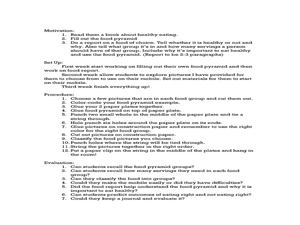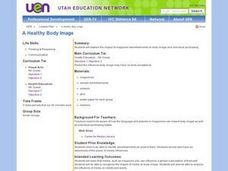Curated OER
Wellness and the Benefits of Exercise
Second graders discuss benefits of keeping physically fit, predict effects of exercise on their bodies, perform various exercises correctly, including push-up, curl-up, and jumping jack, discuss and follow safety practices while...
Curated OER
What Would You Do?
Students explain how we all face tough decisions everyday. They show how they respond to those events reveals who they are and where they are in their character/moral development. Students predict how to deal with peer pressure and...
Curated OER
Health and Physical Education
Second graders read the story, Just a Minute. They create books with physical activities listed. They predict how many times they can perform that activity in one minute.
Curated OER
A Billion Hungry People
Students discover the inequality of food distribution. In the hunger lesson, students discuss how some places and people do not get the food they need to survive. Students role play distributing pretend meals to people (of unequal...
Curated OER
What's important? Knowing your facts, yourself and your role models
Third graders review safety rules about alcohol, tobacco and medicines. They learn healthy alternatives to using alcohol, tobacco and medicines. They recognize healthy and unhealthy choices
Curated OER
Which Side to Choose? An Exercise in Choices and Ethics
Students evaluate their reaction to a series of statements to investigate that personal choices are based on personal goals, peer and social pressures, ethic and religious beliefs, and the knowledge of biological consequences. This is...
Curated OER
Food Pyramid Mobile
Third graders study the food pyramid. In this diet lesson plan, 3rd graders discuss healthy foods, food servings, and food groups. Students cut out a few pictures from magazines representing each food group and create...
Curated OER
Playground Safety
Students conduct experiments with fruit falling from playground equipment to explain the effects of falling off playground equipment.
Curated OER
Bizarre Food
Students research foods from other countries. In this multicultural food lesson, students view a list of foods that kings and queens ate on an overhead transparency and go to the website www.jamessolheim.com/teachers1.htm to read about...
Curated OER
Spicy Hot Colors
First graders discover the importance of primary colors by reading a book in class. In this art lesson, 1st graders read the book Spicy Hot Colors, and discuss the three primary colors and the numerous combinations they can make....
Curated OER
The Cleverest Thief
Students practice their reading comprehension while listening to a classic folktale from India. In this cultural storytelling lesson, students read the book The Cleverest Thief and complete word identification worksheets based on...
Curated OER
Holy Mole
Students discover Mexican culture by reading and cooking. In this Central American History lesson, students read the book Holy Mole, and analyze the story by answering questions about plot, characters and even sound effects they...
Curated OER
Creating an Online Disease Pamphlet Using Online and Print Resources
Eight grade health learners choose a disease to research. They compose their information and create a brochure to give to people who are affected by their chose disease. They address the history, causes, symptoms, diagnosis, and...
Curated OER
The Five Senses
Study various objects and help kindergarteners use their five senses to classify the objects. They are presented with various objects and then use their five senses to sort and classify the objects. Then they use a Visual Ranking Tool to...
Curated OER
Shared Reading: Wishy-Washy Day
Students experience two pieces of literature that discuss the importance of taking a bath.
Curated OER
Epidemiology: Graphing and Analyzing Health Data
Students graph data on fetal and infant mortality rates collected by the Centers for Disease Control and Prevention. They identify trends in the data and propose potential causes for the trends.
Curated OER
The Very Hungry Caterpillar
Students explore the concept of good nutrition. In this The Very Hungry Caterpillar instructional activity, students read the Eric Carle Story and make a nutritious treat with healthy foods.
Curated OER
Washing Hands
Students read stories, conduct experiments and create graphs as they consider the importance of proper hygiene in maintaining their health. They identify the best way to wash hands and design handwashing posters for classroom placement.
Curated OER
Advocacy Through Letter Writing
Students develop an advocacy plan to address a health-related need for a local, national or global health problem. Students write a detailed letter as part of their advocacy plan.
Curated OER
A Healthy Body Image
Fifth graders discuss what is meant by body image. In groups, they view a variety of magazine advertisements and identify how it encourages them to buy a specific product. To end the lesson, they group the people in the ads as either...
Curated OER
Life's Lessons: Survival of the Fittest
Students analyze Jack London's use of anthropomorphism to identify the importance of adaptability in life. In this literature lesson, students use the novel The Call of the Wild to identify key elements in survival. Students...
Curated OER
Health Education: An Integrated Approach
Second graders advocate to others the dangers associated with excessive sun exposure. In this health lesson plan, 2nd graders participate in an experiment in order to identify methods for protecting themselves from the sun.
Curated OER
Graph Around the Room
Students discuss the importance of taking care of their bodies. They brainstorm ways to take care of their bodies. They create a graph.
Curated OER
Why Walk?
First graders listen to the book Yummers. They use the food pyramid to evaluate what Emily Pig ate during her walk and find out why her walk made her sick. They participate in a walking game.
Other popular searches
- Predicting Outcomes
- Reading Predicting Outcomes
- Predicting Outcomes Math
- Predicting Outcomes in Reading
- Ged Predicting Outcomes
- Predicting Outcomes in Stories























